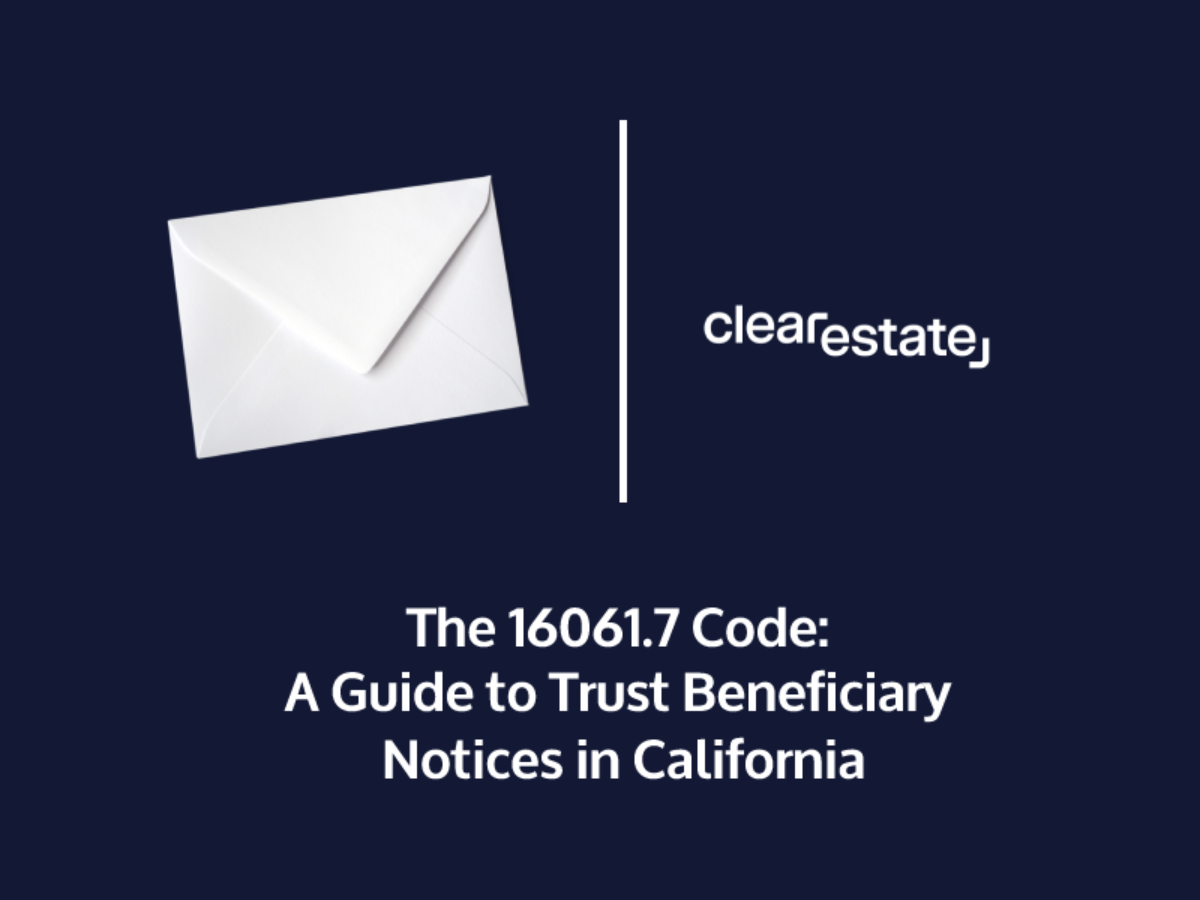Estate Settlement
May 01, 2025
What to Do When Someone Dies in California
Follow this step-by-step guide to navigate legal duties, probate, and estate tasks with clarity and confidence.
In our guide, we break down the first step to trust administration: notifying the trust's beneficiaries. If you're a successor trustee, you can’t afford to miss this.


Article Contents
Acting as a successor trustee for a California-based trust is an honorable position: someone has given you the duty of administering their assets to their beneficiaries and to take care of the trust’s investments, among other obligations. While being recognized as someone trustworthy and responsible enough to handle such complex duties is admirable, these duties can bring up a host of questions.
One of these questions might be how you should communicate with beneficiaries of the trust when major change occurs within the trust, such as the trustee passing away. But, there are strict rules as to how communication between these parties should take place, especially when it comes to formal notifications to the beneficiaries.
The California Probate Code Section 16061.7 states that a successor trustee has a legal obligation to notify all beneficiaries and heirs in the case of major changes to a trust. A trustee may face financial and legal consequences if the required notification does not comply with legal standards. Therefore, it is crucial for a successor trustee to fully understand both the content and purpose of the trust beneficiary notice.
Let's take a closer look at potential scenarios when a trustee is required to send a notification and what information this notification should contain so you can feel confident in fulfilling your legal obligations. We’ve also included a handy sample notification letter and checklist so you can start off on the right foot.
As outlined in Probate Code Section 16061.7, the beneficiary trust notice is a required document sent by the successor trustee and to inform eligible beneficiaries and heirs about the ongoing process of trust administration.
The trust notice serves two purposes: it protects beneficiaries and keeps them informed about the commencement of the trust administration process.
In addition, it empowers recipients by informing them of their right to challenge the trust and request further copies of trust documents. By fostering transparency and fairness, this notice plays an instrumental role in the just administration of a trust.
There are three scenarios in which a trust notice to the beneficiaries and heirs of a trust must be sent.
The Probate Code Section 16061.7 stipulates specific instances which mandate the issuance of a trust notice by a trustee or successor trustee:
Death of the Settlor. If a revocable trust in its entirety (or a portion of a revocable trust) becomes irrevocable due to the death of the settlor, a notice must be sent out.
Change of Trustee: If a successor trustee is appointed to manage an irrevocable trust, all beneficiaries and heirs are to be notified.
Death of the Settlor with Power of Appointment: If a settlor, who had the power of appointment over an inter vivos trust, passes away, a trust notice must be dispatched. This applies even if the trust was originally deemed irrevocable, or was intended to be so from its inception.
As a general rule, any event other than the above that causes a revocable trust or a portion of it to become irrevocable, a trust notice must be sent out to the required parties.
The Probate Code Section 16061.7 mandates a Trust Notice under these circumstances to uphold transparency, maintain accurate communication, and ensure all beneficiaries and heirs are aware of significant changes concerning the trust's administration.
There are five key points that a successor trustee should include in the trust notice:
The date of execution of the trust document and the identity of the settlor or settlors
The contact information of each trustee, including address, name, and phone number
The physical address of the principal place of administration of the trust
Any other information required by the terms of the trust
A notification informing the recipient of a right to receive a true and complete copy of the terms of the trust from the trustee
According to the California Probate Code 16061.7, the trust notice may be considered incomplete and void if any of these key points are missing.
In addition, when the notice is served in the case of the trustor's death, it should also include the following text:
"You may not bring an action to contest the trust more than 120 days from the date this notification by the trustee is served upon you or 60 days from the date on which a copy of the terms of the trust is delivered to you during that 120-day period, whichever is later."
Under the California Probate Code, a successor trustee has 60 days to send the notice following the trustor's death.
More specifically, the California Probate Code states:
“(f) The notification by trustee shall be served not later than 60 days following the occurrence of the event requiring service of the notification by trustee, or 60 days after the trustee became aware of the existence of a person entitled to receive notification by trustee, if that person was not known to the trustee on the occurrence of the event requiring service of the notification. If there is a vacancy in the office of the trustee on the date of the occurrence of the event requiring service of the notification by trustee, or if that event causes a vacancy, then the 60-day period for service of the notification by trustee commences on the date the new trustee commences to serve as trustee.”
If a trustee fails to send the required trust notice within the specified 60-day period, California Probate Code Section 16061.9 holds the trustee responsible for all resulting damages, attorney's fees, and costs unless the trustee can prove a reasonably diligent effort was made to comply. This section ensures trustees act transparently and promptly to protect beneficiary and heir rights. It also allows trustees to consider the 120-day contest period before distributing trust assets, promoting fairness and accountability in trust administration.

Here is a useful checklist and a sample letter to use to send out Trust Notice in California. Pay attention that this sample letter contains all the key points as required by California Probate Code 16061.7.
Disclaimer: This is a general sample of a notification letter to Trust beneficiaries in California. Please consult an estate professional to guide you through the requirements and tailor the letter to your specific situation.
Subsection 16061.7(e) of the California Probate Code indicates that trustees can send a notice to the last known address of a beneficiary or heir using the following methods outlined in Section 1215 of California’s Probate Code:
Delivered by first-class mail if the beneficiary or heir resides within the US (e.g. registered, certified or express mail)
Delivered by international mail if the address is not within the US, including first-class international mail, priority mail international, express mail international and global express guaranteed amil.
Delivered personally to the beneficiary or heir
Delivered electronically to the beneficiary or heir so long as the recipient has expressly consented on the appropriate form(s) to receive electronic delivery in the applicable court hearing, and the recipient has provided an electronic address for that purpose
As the receipt of the trust notice starts a clock regarding challenges to the trust, it’s of utmost importance the trustee has an accurate timeline as to when the notices were received. Sending the notices by registered or certified mail is one way to ensure you have a proof of receipt of the notice.
Yes. California law is clear that trustees must send a copy of the trust (and any amendments) to any beneficiary or heir that requests it following receipt of the trust notice. Failure to do so is considered a breach of the trustee’s fiduciary duty and could result in intervention from the courts—and the trustee is on the hook for the beneficiary’s legal fees.
The anti-lapse law applies in case of a trust beneficiary's death before the estate is settled in California. The anti-lapse rules are stated in California Probate Code Section 21110, which is usually referred to as the "anti-lapse statute."
Let's imagine that Jack is a trust beneficiary and has recently received a trust administration notice from the successor trustee. Jack passes away unexpectedly during the trust administration process before the distribution phase. So what will happen to his share of the trust assets?
According to the anti-lapse law, Jack's share of trust assets will become part of his estate, even if they were not distributed. Jack's children will get his share of the trust assets, and they will split it equally among themselves, according to California Probate Code Section 240.
In some cases, the terms of the trust may have a provision stating how assets should be distributed if a trust beneficiary dies before the estate is settled in California. If such provisions are present, then the issue of the deceased beneficiary (transferee) doesn't take his or her place (California Probate Code Section 21110).
Remember: Trust administration usually takes longer when one of the beneficiaries dies. The successor trustee needs to take extra steps to ensure that all the assets under the trust are properly distributed to the deceased transferee issue.
In conclusion, understanding the intricacies of the Probate Code Section 16061.7, particularly as it relates to trust beneficiary notices, is essential for both trustees and beneficiaries in California. Clarity and accuracy in communicating trust changes can not only ensure legal compliance but also foster transparency and fairness among all involved parties.
Managing these complexities may seem daunting, but you don't have to navigate this process alone. Our seasoned estate and trust professionals are here to guide you every step of the way.
Let us help you smoothly and efficiently wind up the trust, ensuring all obligations are met and your peace of mind is secure. Book a free consultation with us today.
 Sample Notification Letter to Trust Beneficiaries in California + Checklist
Sample Notification Letter to Trust Beneficiaries in California + Checklist
Here is a useful checklist and a sample letter to use to send out Trust Notice in California. Pay attention that this sample letter contains all the key points as required by California Probate Code 16061.7.
Download Here